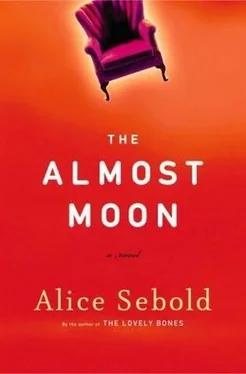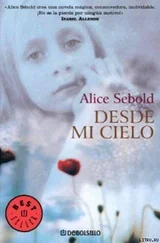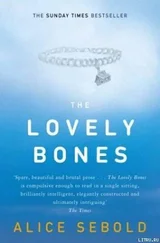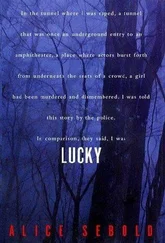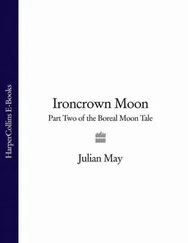I thought of a handmade felt Christmas ornament my mother had sent me in Wisconsin one year in the middle of July. It was meticulous in every detail, from the sewn-on beads in the shapes of ornaments, no two alike, to the loop at the top, which had been braided from silk floss. The card, tucked inside the box, had said, “I made this. Don’t waste your life.”
As the students filtered out, the man in the sport jacket came up to the platform. “Helen Knightly,” he said, extending his hand. “I’m Robert Broumas, Phoenixville police.” His hand hung in the air, and I motioned toward my own hands, which were clasping the gown in front of me.
“Yes?” I said.
“I’m afraid we have some disturbing news.”
“Yes?” I thought about how to prepare for it, what to say. The surprise party without the surprise was coming, and I had no idea how to behave.
“A neighbor of your mother’s found her this morning,” he said.
I stared at him and then at Tanner.
“I don’t understand.”
“She’s dead, Mrs. Knightly. We have a few questions to ask.”
I could not form an expression of any kind. He watched me intently, and I could do nothing but look back at him. To rise or leave the platform felt cowardly to me, an admission of my guilt.
If I could only have willed myself to faint, that small slice of oblivion would have been welcome, but I could not. I had wanted to faint upon seeing my father, but instead I had heard my mother’s voice. “She’ll help me clean up,” she’d said to the police officer nearest her, and not knowing what else to do, I had gone straight to the kitchen, filled his old hospital sick bowl with water, and returned to the hallway to find my mother standing barefoot in my father’s blood.
“He finally did it,” she said. “I never thought he would.”
I had wanted to hit her, but I was aware of the officers watching us, and in my hands I held the bowl.
When I was twelve, I found a photograph of my father in the small metal drawer beneath his workbench. He was a young man in the picture and stood outside an old brick row house. He was posed on the stairs, which were imposing and made from poured cement. On either side were brick-and-mortar pilasters. He wore a crumpled white shirt and pleated trousers, a thin brown belt holding them up. Next to the stairs where my father stood was the corner of a large square Dumpster in the scrappy patch of yard. Table legs and what looked like a chair poked up above the rim.
By twelve I had already begun to listen for when my father spoke about the place he came from. It was called Lambeth, and on the new maps, it no longer existed except as the name of a dam along the Delaware.
My mother called it the Dirty City because after they’d closed down the town and evicted the people-“relocated,” a nice word for what they’d done-they had built a dam that redirected the river and was supposed to result in the obsolescence of the town.
Instead, despite the careful calculations of the engineers and draftsmen, what roared through town was a wall of mud that grew chunky with floating mowers and brittle with the skeletons of animals from backyard graves. After six months, it receded and left the upper parts of the town merely drenched in mud and ruined by water.
The official flood had happened shortly before he met my mother at the John Wanamaker shoot. “It’s why I went into water,” he would explain to people. The flooding had coincided with the buildup of surrounding towns, including Phoenixville. “Lambeth paid for the Holy Ghost Social Center,” my father would point out when we drove by the squat brick-and-silver building.
On my thirteenth birthday, he had decided I was old enough to go with him to the drowned town where he’d grown up. He packed a picnic basket for the two of us and kissed my mother lightly on the forehead. “Be well, beautiful,” he said.
Forty minutes later, I could sense the atmosphere palpably change inside the Oldsmobile as we approached the town, where low one-story cottages and five-house rows of brick homes still shared peaceable blocks until the streets dipped underwater and reappeared in the distance, a few miles on.
His house, when I finally saw it, was a ruin of the building in the photograph. It stood in a row of condemned homes that, though slated for demolition, had been left in place year after year. The only remaining access was by a patched asphalt road that fell off on either side into culverts eroded by water. Trying to avoid the yawning potholes meant that he wove the car in and out of lanes like a drunk might. To me it was a sickening carnival ride.
At last we stood outside the front door, and he took my hand as we picked our way up the rotting stairs.
“This is where you stood in the photo,” I said.
“Nature takes things back,” my father said. “Watch your step on the porch.”
And sure enough, the planks, stripped over time of their protective paint, were all but rotten. Someone-my father, I realized-had placed a new sheet of plywood down so you could make it to the front door without falling. I saw the sawed edges of a faulty arabesque and recognized it as what remained after he had carved out the arching back of a rocking horse.
We walked into the front hall, and I spotted a propane lamp sitting on an old mule-ear chair. It was from his workshop.
“There’ll be things in here,” he said, “that we don’t need to tell your mother about.”
I had begun to vary my reading at school with squirreled-away paperbacks that did not appear on our reading lists, and I knew, I thought, what comprised “men’s needs.” I pictured what Natalie and I loved the sound of: a den of iniquity. There would be velvet drapes and throw pillows and some sort of women smoking things out of pipes that looked like vases but weren’t. That’s as far as my imagination went, but I thought I was prepared.
I wasn’t.
I didn’t even know what to make of them at first.
Not in the hallway or the front room but in the back rooms on the first floor and in the bedrooms of the floor above, I saw and understood what my father had been doing over the years in his workshop when he was not busy with his rocking horses. He had been making figures out of plywood.
When I walked into the kitchen and saw wood nailed to the wall-a finely articulated shadow of two adults and a child sitting at a table-I stepped back.
“Dad!” I said.
“I’m right here,” he said.
And he was, standing right behind me just inside the doorway.
“That’s so cool,” I said.
I could sense his rare smile even though I wasn’t looking at him.
“I’m glad you like them.”
I went up and traced the head of the child lightly with my index finger, careful of splinters. They were rough and unpainted, and what held them fast was a variety of screws and nails.
“Is this supposed to be you?” I asked, my palm spread flat against the chest of the child.
“Yes,” he said. “And that’s my mother and father. This is the second one I made. You were very little then.”
It must have struck me at some point that this meant he had been building a family out of plywood over a stretch of about a dozen years. At the time I felt the adrenaline rush of the shared secret between us, something my mother wasn’t privy to.
“Is this where you went that time?”
“No,” he said, and gave the standard line. “I was in Ohio, visiting friends and family.”
By thirteen I sensed this was a lie my parents told, but I still didn’t know why.
It was cold in the rooms, as there was no heat, and the plaster around the plywood people was nearly down to the boards, but I could see why he liked it here. It was deathly quiet except for the tree branches scraping against the windows. Occasionally, a pane would break, my father said, “from the trees’ desire to occupy the place.”
Читать дальше
